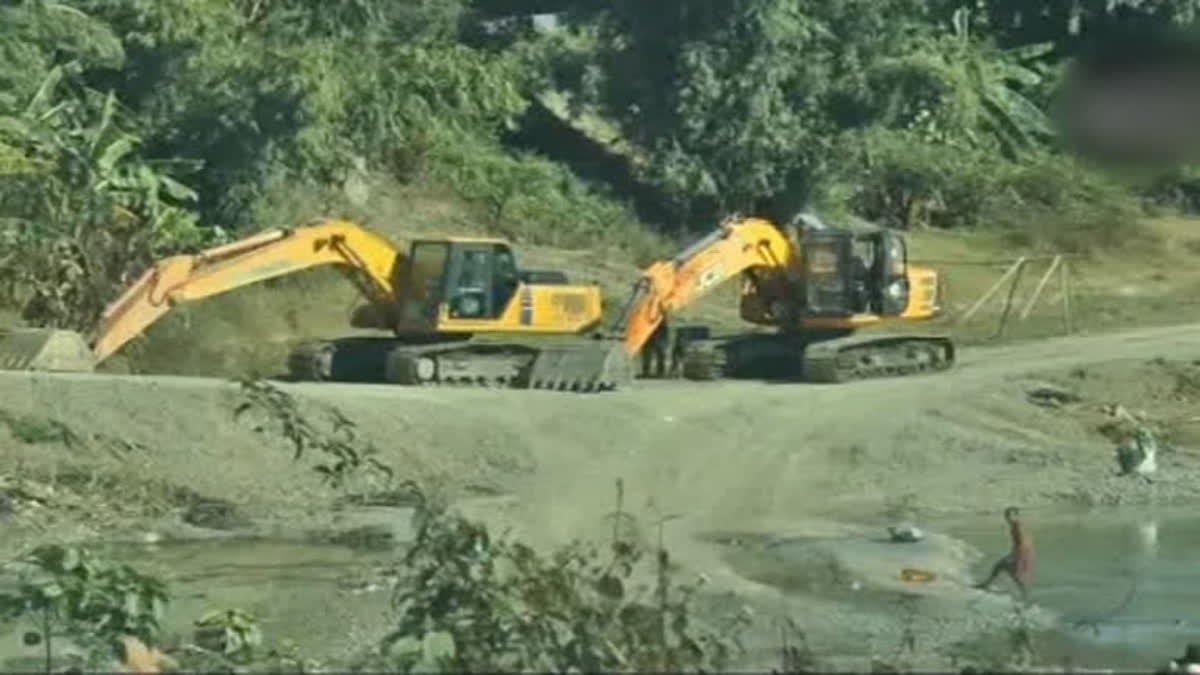Hyderabad: The haphazard excavation of sand from river basins and coastal shores across the country paints a grim picture of our future. Ecosystems, once diverse and thriving, now face irreversible damage. The repercussions are felt acutely, as floods and calamities wreak havoc, leaving communities in distress. The extraction of natural resources, particularly sand, poses a unique challenge-its restoration is a near-impossible task once the extraction is done.
Regrettably, sand mining remains rampant in our river basins and along our coastlines, with the consequences echoing far beyond the present moment. Our ecosystems suffer, and the toll on communities is immeasurable. Sand, often underestimated in its significance, is one of the most extracted mineral resources in the country. To address this issue, the Union Ministry of Environment has formulated specific guidelines, designed to ensure that sand mining occurs only with proper environmental clearances. However, the effective implementation of these guidelines has proven to be an elusive goal for many state governments.
Even though both the green tribunal and the Supreme Court have endeavoured to enforce regulations and safeguards, the efforts appear to have fallen short of their intended impact. A recent instance involves the National Green Tribunal's intervention to curtail illegal sand mining in Andhra Pradesh, emphasizing the necessity of obtaining proper environmental permits.
The situation demands immediate and collective action. Preserving our ecosystems, safeguarding our communities, and securing our vital resources necessitate a fundamental shift in our approach to sand mining. It is imperative for all stakeholders - government bodies, local administrations, industries, and citizens - to collaborate closely in the pursuit of sustainable and responsible sand mining practices. Only through such conscientious efforts can we hope to reclaim a promising future for both our environment and ourselves.
Unimplemented Guidelines Amplify Pressing Concerns of Uncontrolled Sand Mining In the realm of construction, the omnipresent use of concrete has become an indispensable component, spanning from modest abodes erected by the economically disadvantaged to soaring multi-story edifices erected by industrial conglomerates and real estate enterprises. Regrettably, this phenomenon has fuelled an unchecked surge in sand mining activities, affecting rivers, reservoirs, catchment areas, and coastal regions indiscriminately. This burgeoning exploitation of sand reserves has brought about a surge in flooding incidents over the years, while concurrently exacerbating river pollution. Simultaneously, a distressing trend of water scarcity and depleting reservoirs has emerged, casting a shadow over drought conditions.
Within our nation's mineral mining consumption framework, sand contributes to approximately 12 percent of the total share. Classified as a minor mineral under the Mines and Minerals (Development and Control) Act-1957, sand's significance is underscored. Notably, five years ago, the National Green Tribunal issued a decisive mandate stipulating that any area exceeding five hectares necessitates adherence to the Environmental Impact Assessment provisions delineated within the Environment Protection Act-1986.
In light of these challenges, the Union Ministry of Environment took the initiative in 2016 to devise comprehensive guidelines aimed at fostering sustainable sand mining practices and responsible procedures. For minor minerals, including sand and gravel, a district-level environmental impact assessment authority, helmed by the District Magistrate, is entrusted with gauging vulnerability. Moreover, a conscientious effort must be invested in instituting measures to mitigate the aftermath of extraction-induced damages. However, these guidelines have often faltered in execution due to a dearth of adequate monitoring personnel at the state level, rendering effective oversight a formidable challenge.
A pivotal monitoring committee, spearheaded by Justice S.V.S. Rathode, assessed the outcome of tribunal mandates in a report several years ago. This report starkly illuminated states' shortcomings and highlighted the necessity for meticulously crafting District Survey Reports for excavation zones. Proposals encompassed the implementation of comprehensive sand resource extraction strategies and environmental ownership plans. Additionally, the report mandated the annual scrutiny of excavation zones by environmental experts, with rectification of identified discrepancies. To ameliorate the toll on natural systems, it proposed the allocation of funds from royalty revenues.
Regrettably, the implementation of these guidelines and recommendations has frequently been stymied by allegations of corruption, irregularities, and political interventions at various junctures. Over the past four years, the Andhra Pradesh government has twice revised its policies on sand mining, designating a singular private enterprise for extraction activities within specific demarcated zones. This unilateral approach has drawn stern rebuke from the Green Tribunal, particularly when instances surfaced of unpermitted excavations conducted by the company in question.
Instances of regulatory non-compliance are not exclusive to Andhra Pradesh. The Telangana government faced censure from the Green Tribunal over sand mining in the Godavari region. Similarly, last November, three Haryana-based companies were penalized a sum of Rs 18 crore for unauthorized mining activities. Furthermore, the Uttar Pradesh Pollution Control Board, in June of this year, imposed a fine of Rs 4.29 crore on a company engaged in unauthorized sand extraction within the Ganges basin.
A salient point to emphasize is the categorical stipulation that mining activities within river basins nationwide necessitate explicit authorization from pollution control boards, a condition that must be unequivocally respected. Promoting Alternatives for Sustainable Resource Management State governments must rise above regarding sand mining as merely a fiscal wellspring. Upholding prescribed guidelines becomes paramount to safeguard the delicate equilibrium of nature. Elevating transparency and accountability in sand mining activities, involving revenue, police, drainage, and panchayat raj department personnel, is a pressing need.
As a counterpoint to sand, the exploration of substitutes such as refined stone sand from mineral resources like limestone and copper, thermal power station ash, construction waste, recycled plastic, bamboo, and wood, presents a viable path. While these alternatives may entail a higher cost than sand, fostering their increased adoption emerges as a judicious trajectory for the future.
The utilization of solid waste should be augmented in the construction of national, state, and rural roads, overseen by both central and state government departments. Diminishing reliance on sand can be facilitated by motivating young individuals and enthusiasts to establish units dedicated to alternative resources. Striving to restore the ecosystems of river basins, coastlines, and forests marred by sand mining is a moral imperative. Amplifying civil society's engagement is pivotal in the crackdown on illicit mining activities. The government machinery, propelled by genuine commitment, should collaborate fervently to extirpate unlawful mining practices and propagate frugality. Perilous Ramifications
Beside major rivers like the Yamuna, Ganga, Kaveri, Godavari, and Krishna, numerous minor and major river basins across the nation bear the brunt of extensive sand mining. This relentless pursuit imperils ecosystems and the rich tapestry of biodiversity. When the extraction of natural resources such as sand is pursued without due regard for sustainability, the repercussions can be dire.
This story was first published by Eenadu
(The writer is a social activist and an environmental journalist, who writes on developmental issues around the Eastern Ghats. Disclaimer: The opinions expressed in this article are that of the writer. The facts and opinions expressed here do not reflect the views of ETV Bharat.)



